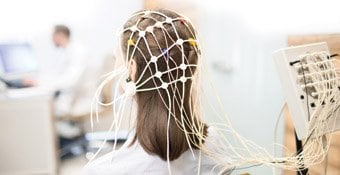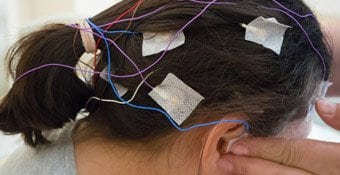Epilepsy Testing
Your health care provider has recommended testing to determine if you are having epileptic seizures. Nearly 3 million Americans have the diagnosis of epilepsy, and it is the fourth most common neurological condition. However, not all seizure like spells are caused from epilepsy.
In order for your provider to learn more about your condition, they have recommended that you be admitted for further testing. This testing is done either to determine if you are having seizures, to understand more about your seizure disorder, to make treatment changes in a safe environment or to obtain more information to determine if you are a candidate for surgery to treat your epilepsy.
Phase One Testing

Electroencephalogram (EEG) Test
Patients will be admitted to the hospital for approximately five to seven days. During your stay, you will have continuous electroencephalogram (EEG) with video monitoring in order to record epileptic seizures.
Typically, patients are taken off their anticonvulsant medication to promote seizures during their stay. Three or more seizures are recorded on video and EEG. Medications may be adjusted at that time; prior to being discharged.
Other testing done during this time period may include a specialized MRI scan and a positron emitted tomography or PET scan. This test is done in the outpatient setting at the hospital and involves having an IV catheter placed and an injection of a radioisotope to look at how the brain metabolizes sugar.
In areas where seizures begin, there may be reduced metabolism which may show up on the brain scan which can help verify the diagnosis.
Neuropsychological Testing
Contact Us
If you have any questions, please contact Karen Secore, Nurse Navigator for the Cottage Epilepsy Center at: 805-832-3633
Neuropsychological testing is also helpful in locating the part of the brain that may be causing seizures. These penand-paper tests measure motor skills, language abilities, and memory, and can take four to six hours to complete.
This testing is usually performed in one visit at the Cottage Rehabilitation Hospital. We have several specialized Neuropsychologists with experience in evaluating patients with epilepsy.
Additional Testing
If your evaluations suggest that surgery may help you, you will have a Wada Test. It evaluates whether a patient is a good candidate for surgery, or it is used as a preparation for surgery.

Wada Test
The test is the only known way to examine how a specific side of the brain works. It does this by:
- Determining the memory and language functions in each side of your brain
- Mapping how each side of your brain works
- Tracing the arteries that supply blood to each side of your brain
If necessary, an ictal SPECT scan may be recommended to help the doctor find out where the seizures are beginning. This would require being admitted for additional video/EEG. Similar to phase one testing, your medication may be reduced before you are admitted to encourage seizure activity.
During this test, a radioisotope is injected into your vein during a seizure, and then you will have a SPECT scan. The procedure is then repeated when you are not having a seizure so your doctor can compare the two results.
Following these tests, your epilepsy physician will have a meeting with all members of the epilepsy team to discuss your case and come up with the best treatment plan. The recommendations of the team meeting will be presented to you so that you can make an informed decision regarding your treatment.
If the epilepsy team determines that you need more detailed testing, you will go to phase two, which involves the use of surgically placed electrodes into and over your brain to determine where the seizures are happening.